- Home
- Jacob Peppers
A Sellsword's Valor Page 14
A Sellsword's Valor Read online
Page 14
Yes.
Aaron sighed. It wouldn’t make dealing with the guards any easier and as soon as he had the thought, he realized that they were still going in. That he was going to lead them there. Into that city of fear and darkness. After all, what choice did they really have?
“Is everything alright, Aaron?” Darrell asked, and Aaron forced his gaze away from the city to the swordmaster crouched beside him.
“I don’t think so, Darrell. There is something wrong with the city—the people there are afraid. So afraid that I can feel it even from here.”
The older man’s eyes widened, “Do you mean…the Virtue?”
Aaron grunted, “Yeah.”
They all turned to look back at the city, as if they might see some proof of whatever evil was taking place behind its walls, but there was nothing.
“Well,” said Wendell finally, breaking the uncomfortable silence, “what do you reckon we should do, General?”
“We go in,” Aaron said, “it’s the only real option we have. Whatever it is, let’s pray it has nothing to do with us. We came here for a reason, and the reason hasn’t changed. That said…” He paused, turning to look at the others. “If any of you wants to turn back, I won’t fault you for it. I don’t know what’s happening in Baresh, but whatever it is, I get the feeling it’s dangerous.”
The three men met his eyes, and Wendell grunted. “Of course we’re goin’, sir. Now how about we stop yackin’ about it and get this thing done?” Crouched on the balls of his feet like the rest of them, he motioned to his legs. “We sit here like this much more, I won’t be able to walk, let alone fight.”
“If it comes to a fight,” Aaron said, “we’re dead already.” He took a moment to consider as they watched him, waiting for him to tell them how it would be. “Alright,” he said finally, “this is how we’re going to do it…”
***
Aaron stood in line, waiting for his turn at the gate. They’d decided to go in separately as they would be less likely to draw attention or be remembered that way, and he had insisted that he be the first one to attempt entry through the gate. Wendell had argued at that, claiming that he should be first in case anything went wrong, but Aaron had held firm and finally the man had relented. The fool wanted the first chance at getting his head separated from his shoulders.
Yes, Co said in an amused voice, what a fool he is. Surely, no one would volunteer for such a thing. At least, no one except a fool, that is.
This is different, firefly, he said, I’m the general.
Forgive me, she said, I had forgotten that generals always fight at the front of the battle, risking their lives before the soldiers themselves.
“Damnit, this is different,” Aaron said again, and a thin, older man leading a cow by a rope leash glanced back at him suspiciously. “Hi,” Aaron said, “sometimes I talk to myself. Sorry.” The man frowned and grunted what might have been taken as a greeting before turning back around.
He thinks you’re crazy, Co said.
I know that, firefly, Aaron snapped back, I can feel it just like you. And anyway, the bastard’s probably right.
No argument here, not on that, at least. I still stand by my opinion that it’s stupid for you to try the gate first. Wendell could have done it just as well, probably better, and Leomin certainly could do it better—that man’s got a silver tongue just like Aliandra did. And I hope you don’t take this the wrong way, Aaron, but you’re not particularly good with people.
Or floating balls of light with superiority complexes, he added, and though she didn’t respond, he could feel her sulking, and that was alright. He didn’t feel like talking just now, didn’t feel like justifying his decision. He’d given Wendell reasons for him going first, of course: if he was somehow captured, Wendell, who knew more woodcraft than the others put together, had a better chance of escaping than any of them. As for Leomin, the only thing the Parnen knew about swords seemed to be how to make another man want to stab him with one. Besides, the swordmaster had not been involved in their escape from the city and therefore wouldn’t be as good a test. It was better for Aaron to try. That way, they would know—and quickly, he didn’t doubt—whether or not the guards at the gate were looking for men matching their descriptions.
These were the reasons he had given, and they had worked. The problem, of course, was that they weren’t the real ones. The real reason was that Aaron felt responsible for the men with him. If not for him, they would have been back at Perennia safe or, at least, as safe as any man could be in such times. Gods, I’m becoming soft, he thought.
No, Co said, you are becoming human, Aaron. Not such a bad thing, really.
Aaron grunted but chose not to reply to that. His bond with the Virtue had grown so strong that it was difficult to separate the effects Co had on him with his own personal feelings—impossible really. The compassion and the rage both, always there, a part of him now. Still, at least he’d felt nothing so terrible, so all-consuming as the rage that had led him and the other Ghosts to slaughter the men at the gate, the rage that had driven them away from a perfectly good, defensible position and into a waiting army of thousands of soldiers. A foolish thing, that, and it would have been a deadly one had Ellemont not shown up in time, had he not sacrificed himself to save them.
If you hadn’t done what you did, Aaron, the entire city would have fallen.
Aaron didn’t answer, but he forced the shame that had begun rising in him down, burying it. There would be enough time for that later, if they survived. Now though, he had other things to worry about. Such as the guard who eyed him warily as he stepped forward, doing what he could to mimic the slightly beaten down, weary step of the farmers.
“Whoa there,” the guard said as if Aaron had been galloping full speed on a horse instead of shuffling toward the gate.
“Hello, sir,” he said, nodding.
The guard studied him. “And what brings you to Baresh?”
“The war, sir,” he said, taking the tack that he and the others had agreed upon. “I had a farm—a small one, nothing fancy, but it was burned in the fighting outside Perennia. I’ve come to Baresh hoping to find work.”
The guard looked around. “No family with you then, farmer? No wife or little kiddies running about?”
Most guards would have been satisfied with that answer but not this one, it seemed. The man was good at his job. The bastard. “No sir,” Aaron said, thinking on the fly, and he did his best to look exhausted and sad. The first, at least, wasn’t too much of a stretch. Not at all. “Had a wife, but she died. In the fighting.”
“Died, did she?” the man asked, nodding slowly. “Sorry to hear that one, friend. Those bastards in Perennia. There’s no end to what they’ll do.”
Aaron was as much surprised by the compassion in the man’s expression as the sincerity in his voice. “Thank you,” he said, bobbing his head in a slight bow, “I appreciate that. The gods know I’m lost without her.”
The man grunted. “Well, come on in then, and I’ll pray that the gods grant you a better turn here than they have so far.”
“Thanks,” Aaron said, “but I doubt it. The gods never do.” He started past the guard. He thought he was going to make it, was nearly inside the gate, when the guard shouted at him.
Wincing, Aaron turned, putting on a depressed expression once more. “Sir?”
The man nodded at the bundle on Aaron’s back. “What’s a farmer need with a sword, anyway?”
Aaron did his best to school his features as he glanced over his shoulder and bit back a curse. They’d bundled the sword as best they could in a horse blanket, along with a few other things—a cooking pot they’d used at the campfire, a change of his clothes—but the tip of the sharp metal had slipped out, and there was no mistaking it, no point in lying. His mind raced, and he grunted to buy himself time. “Well, sir,” he said, “since the wife passed, I thought maybe it’d be better to go armed. Farmers die like anybody else, after all, and an unar
med one dies easier than most.”
The man studied him for several seconds, meeting his gaze, and Aaron resisted the urge to reach for the handle of his sword. He would kill the man if he had to, but he didn’t wish it. Doing so would certainly draw the attention of the other three guards at the gate. They’d signal for more help, and soon there’d be an entire city up in arms, and Aaron’s mission would fail before it even truly began. Besides, he found himself thinking of the very real compassion he’d seen in the guard’s eyes when he’d heard of Aaron’s dead wife. Aaron’s wife wasn’t dead, of course—he didn’t have one and it would take some miracle to let him live long enough to ever get one—but the guard didn’t know that. He’d seen only a man in pain, a man who the war had touched and taken from as wars always did, and he had done the only thing he could do in the face of such pain—he had acknowledged it.
The guard took several steps toward him until he was standing very close, and it was all Aaron could do to keep his eager hands from reaching for the blade at his back. Then, the guard surprised him by clapping him on the shoulder, “I understand,” he said, nodding slowly, “I truly do. The war hurts us all, farmer, good and evil alike. We can only pray that King Belgarin is able to quell this rebellion soon, so that we can go back to what lives it leaves us. And you’re right,” he said, nodding to the sword, “these are troubled times, and a man must do what he can to protect what’s his. A word of warning though, farmer. There are strange goings on in the city just now. Perhaps it would be better if you found another city or town to search for work. Vasek is north, only half a day’s walk would bring you there. Nice people—simple but nice. I grew up there, if you’d believe it.”
Aaron hesitated. Why did the man have to be so damned agreeable? If Aaron refused to take his advice, it would look suspicious, but he couldn’t very well travel to Vasek and become a gods-cursed farmer in truth. Then, without even realizing he was doing it, the power of the bond rose up in him, and suddenly he was inside the guard’s mind, feeling his thoughts.
The man was anxious about the things going on in the city, about people disappearing. At the same time, he was excited about the shift changing in two hours so that he could go home and be with his new wife. Of course he’d have a wife. The bastard. Neither of these was the worst though; the worst was the sympathy he felt for the man standing in front of him, a farmer who’d lost his wife in the war. He was considering, not for the first time, doing something different with his life and damn what his father thought. There were more important things than hurting people and scowling at citizens. A baker, maybe. He’d always loved bread and…
Aaron severed the link with the man, shaking his head at the flood of information and feelings. A baker, he thought, gods help me. “Thing is,” Aaron said, deciding on an excuse he thought would resonate with the guard, “I would, sir, truly, and I appreciate the advice. But my wife’s father would never let me hear the end of it. You see, we never have gotten along…he always believed farming was a poor man’s job. Actually wanted me to be a town guard, if you can believe it.”
Aaron sighed heavily. “Maybe I should have listened to him. If I had, maybe my wife would still be alive. He blames me for her death, and I can’t argue it. I’ve come to Baresh because I’ve heard there are a lot of opportunities here. I enjoyed farming, working with my hands, but I always thought to do something else, to be something else.” He shook his head at his own foolishness for the guard’s benefit. “A chandler, if you can believe it. After my wife…well, I packed up everything I owned—everything the soldiers left—and came to Baresh. Thought I’d make a go of it. But maybe you’re right,” he sighed, “and maybe my wife’s father is right too. I just don’t know anymore.”
Laying it on a bit thick, aren’t we? Co asked, but Aaron wasn’t listening. He was focused on the guard, watching his eyes widen slightly.
“No,” the man said, and Aaron tensed as the guard leaned forward and grabbed him by the shoulders, “no, he’s not right, and I was wrong to suggest it. Look, the city is dangerous, just now—I wasn’t lying to you about that—but if you stay smart, stay indoors when night comes then you should be fine. All the ones taken were taken during the night.” He nodded to himself, “Yes, it’ll be fine. You go and live your dream, farmer,” he said, patting Aaron on the back once more, “at least some of us can.” He smiled. “Or should I say, chandler?”
Aaron smiled back. “The gods be kind to you, sir,” he said, and he started toward the gate once more, but paused as the guard grabbed his arm.
“Here,” the guard said, withdrawing several coins from his pocket and forcing them into Aaron’s hands, “it isn’t much—the next time you talk to your wife’s father, let him know that being a guard isn’t all it’s cracked up to be—but maybe it’ll be a start to getting your own shop.”
Aaron stared dumbly down at the coins in his hands for several seconds. Finally, he managed to look back up at the guard and saw that the man was smiling. “Sir,” he said, “if you don’t mind me sayin’ so, maybe you might think of taking your own advice. If things in Baresh are as bad as you say, maybe you should get out of the city while you can and take your wi—anyone you care about with you. After all, is there any dream you have yourself? The war will go on for as long as it will, and I suspect a lot more people will die before it’s over. Why not take your family—if you have one—and find a life somewhere else, away from all the killing?”
The guard considered that, and he nodded slowly. Then he smiled wider than Aaron had yet seen, and before Aaron realized what he was doing, the man had wrapped his arms around him in a hug. Aaron froze for a moment, unsure, then he reluctantly patted the man on the back. “You’re right,” the guard said, his face that of a child who has just been given a treat, “I’m going to do just that. Good luck, farmer.”
Aaron smiled. “Good luck, guard.”
He stood, stunned, as the guard walked over to one of the other men on duty and proceeded to take off his sword and hand it to him. In a moment, he was disappearing through the gate at a near-jog. What. The. Fuck? Aaron thought.
That was amazing, Aaron, Co said, her voice filled with joy, you might have just saved that man’s life.
Or killed him, Aaron thought as he watched the confused looking guard toting the scabbarded sword into the gatehouse. Really should have told him to keep that sword. Shaking his head in wonder, Aaron walked through the gate and made his way into the city.
Baresh was much the way he remembered it, though not as crowded. And those he passed wore very different expressions than the excited, happy faces he’d seen crowding the streets in the days leading up to and during the tournament. They looked at him warily, several going so far as to scowl in his direction. Aaron glanced behind him to make sure that he’d rewrapped the sword at his back but after a moment he realized that they were looking at everyone who entered the gate in the same way.
It’s as if they think that everyone who enters is going to cause trouble, Co said. Perhaps it has something to do with what the guard was saying.
Aaron frowned. And what had the man meant by all of that anyway? “Those who are taken are taken at night,” he’d said. Taken where? Once more, the feeling of doom rushing toward him was back and stronger than ever, now that he was inside the city walls. Then they’re fools, he thought, whatever the trouble is, it’s already here. We need to be very careful here, firefly. Very careful.
As opposed to getting into a life or death fight with the first person that says something you don’t like? That will be a change. It had been meant to be a joke, but there’d been no amusement in her tone, and Aaron knew that whatever he felt, she felt it too.
“Well,” he muttered, “whatever’s happening, it has nothing to do with us. If everything goes according to plan, we’ll be in and out of here before it matters.”
He set off down the street toward the tavern Darrell had told them of, the place where they had all agreed to meet. And how often have your
plans worked out in the past, I wonder? Co asked.
Aaron grunted, and an older woman that was passing him in the street frowned and hurried past. Never, he thought, but a man can hope.
***
Aaron stood in the street, staring at the tavern the swordmaster had told them about. Darrell had said it was out of the way, a place the city guard never went, and he thought that was probably true enough. The tavern was deep in the poor district, a squat, ugly building that reminded him of some of the places his job as a sellsword had forced him to frequent in the Downs. Not a place for nobles or rich merchants out to have a good time—there were always such places, he knew, had been several in the Downs. Such places usually appeared nicer on the outside but were just as rotten on the inside as the other, more obvious ones—a whore in face paint and a fancy dress is, after all, still a whore.
This tavern, though, made no attempts at disguising what it was—a den for criminals. And judging by the two thugs standing outside the doors, eyeing and haranguing anyone that approached, its owner had some understanding of the dangers such a place might attract. Well, Aaron thought, looking at the building with its crooked door, noting that one of the windows had been broken with what looked like a large rock—or possibly a head, there was always that—the place is a shit heap, but at least it’s honest.
If you say so, Co answered dubiously, but it looks filthy. If I had hands, I’d want to wash them just from looking at it.
Good thing for us both that you don’t then, Aaron responded as he made his way across the street toward the tavern.
One of the thugs stepped forward, sneering as he drew close. “And just who the fuck are you and what the fuck do you want?”
Aaron studied the speaker. A small man, a head shorter than Aaron himself, and thin at the shoulders. Aaron could make out a crude, rusty blade slipped into the man’s belt. He’d dealt with the thug’s kind before. Small men with big tempers, always looking for a fight where there wasn’t one, doing their level best to get offended by anything that was said. Normally, he had little patience for such men, but the last thing he needed was to cause a scene. “My name’s Aaron,” he said, “and I was thinking I’d like a drink.”

 A Sellsword's Hope
A Sellsword's Hope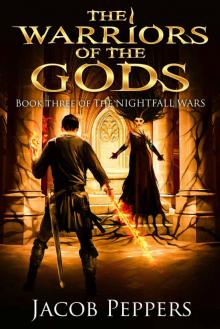 The Warriors of the Gods
The Warriors of the Gods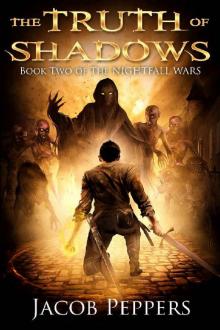 The Truth of Shadows
The Truth of Shadows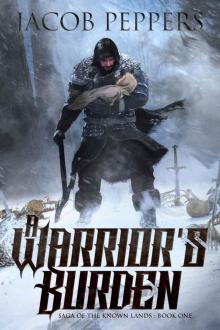 A Warrior's Burden: Book One of Saga of the Known Lands
A Warrior's Burden: Book One of Saga of the Known Lands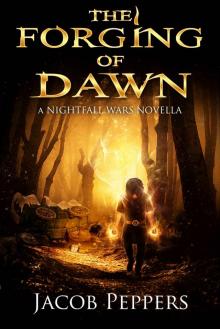 The Forging of Dawn
The Forging of Dawn A Sellsword's Mercy
A Sellsword's Mercy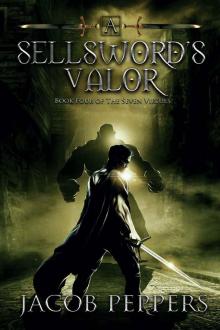 A Sellsword's Valor
A Sellsword's Valor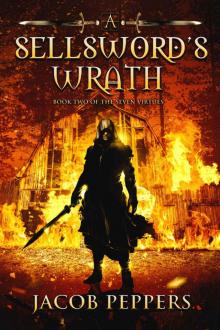 A Sellsword's Wrath
A Sellsword's Wrath A Sellsword's Compassion_Book One of the Seven Virtues
A Sellsword's Compassion_Book One of the Seven Virtues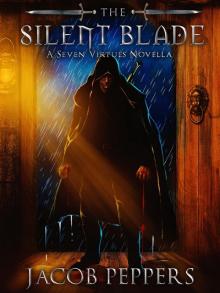 The Silent Blade: A Seven Virtues Novella
The Silent Blade: A Seven Virtues Novella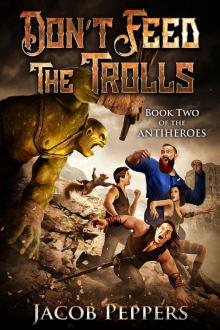 Don't Feed the Trolls
Don't Feed the Trolls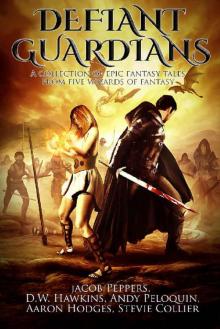 Defiant Guardians Anthology
Defiant Guardians Anthology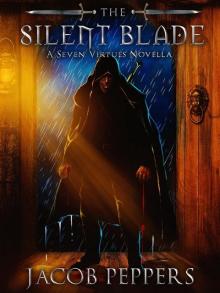 The Silent Blade
The Silent Blade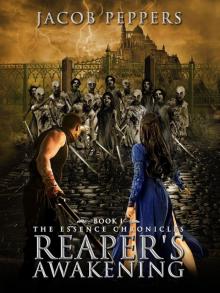 Reaper's Awakening
Reaper's Awakening